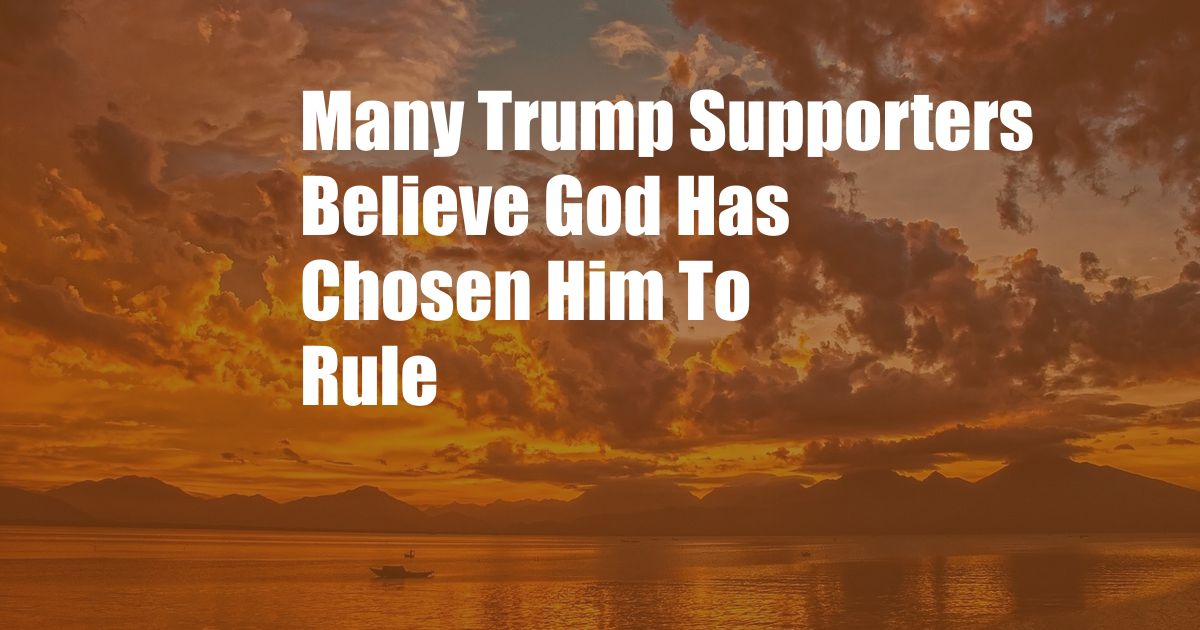
Many Trump Supporters Believe God Has Chosen Him to Rule
A Deep Dive into Religious Belief and Political Support
In a moment of quiet contemplation, I couldn’t help but be struck by the unwavering conviction of many Trump supporters that God Himself has handpicked him to lead our nation. It’s a belief that left me pondering the intricate threads that intertwine faith, politics, and the nature of power.
This fascinating phenomenon, where religious beliefs align with political support, has been a topic of much discussion and debate. In the following paragraphs, we’ll delve deeper into this complex relationship, exploring its historical roots, sociological implications, and the contemporary landscape in which it manifests.
From theocracy to the separation of church and state
Throughout history, the relationship between religion and politics has been a tumultuous one. In ancient times, theocracy was a common form of government, where religious leaders held absolute power and the law was based on religious doctrine. As societies evolved, a gradual separation of church and state emerged, culminating in the modern concept of secularism, where the state remains neutral in matters of religion.
In the United States, the Founding Fathers, deeply influenced by the Enlightenment, enshrined the separation of church and state in the Constitution. The First Amendment protects religious freedom and prohibits the government from establishing any official religion. However, despite this constitutional separation, religion continues to play a significant role in American society and politics.
Understanding the connection between religion and political support
There are numerous reasons why individuals may align their religious beliefs with their political support. Some see their faith as a moral compass that guides their political choices, while others believe that God’s will is reflected in the policies and actions of certain leaders. In the case of many Trump supporters, their religious convictions may have led them to believe that he is the divinely chosen leader who will restore traditional values, protect the nation from enemies, and usher in an era of prosperity.
Social and cultural factors also contribute to this phenomenon. Research has shown that individuals who identify with conservative religious traditions tend to hold more traditional social and political views, which may align with the policies and rhetoric of conservative politicians like Trump. Additionally, religious communities often provide a sense of belonging and shared identity, which can reinforce political affiliations.
Exploring the role of religion in the 2016 election
The 2016 presidential election was a watershed moment in American politics, and religion played a significant role in the outcome. Evangelical Christians, who form a large and influential voting bloc, overwhelmingly supported Trump, with 81% casting their ballots for him. This strong support was driven by a shared conservative worldview, a belief that Trump would protect their religious freedom, and a conviction that he was the leader chosen by God.
Trump’s victory demonstrated the enduring power of religion in American politics and its ability to shape political discourse and outcomes. However, it’s important to note that not all religious voters supported Trump. Many religious leaders and organizations expressed concern about his policies and his personal conduct, and some religious voters chose to support other candidates.
Tips and expert advice for navigating the complex intersection of religion and politics
Navigating the intersection of religion and politics can be a challenging task. Here are a few tips and pieces of expert advice to consider:
- Be respectful and open-minded: Engage with others who have different religious or political views with respect and a willingness to understand their perspectives.
- Separate facts from opinions: When discussing religion and politics, strive to rely on facts and evidence rather than personal beliefs or assumptions.
- Listen and learn: Take the time to listen to the experiences and opinions of others, even if you don’t agree with them.
- Seek common ground: Look for areas of agreement and common values that can bridge political and religious divides.
- Respect the separation of church and state: Remember the importance of maintaining a separation between religious and political institutions and avoid conflating the two.
These tips can help individuals navigate the complex terrain of religion and politics with greater understanding and respect for differing viewpoints.
Frequently Asked Questions (FAQs)
Q: Why do some people believe that Trump is chosen by God?
A: Many factors contribute to this belief, including shared conservative values, a belief that he will protect religious freedom, and a conviction based on religious teachings.
Q: What is the role of religion in American politics?
A: Religion has played a significant role in American politics throughout history, and it continues to shape political discourse and outcomes, despite the constitutional separation of church and state.
Q: How can I navigate the intersection of religion and politics respectfully?
A: Respect others’ views, rely on facts, listen and learn, seek common ground, and preserve the separation of church and state.
Conclusion
The relationship between religion and political support is a complex and multifaceted one. It has shaped the course of history, influenced political outcomes, and continues to be a significant force in contemporary society. By understanding the history, sociology, and psychology of this phenomenon, we can better navigate its complexities and foster a more inclusive and respectful dialogue.
Are you interested in learning more about the intersection of religion and politics? Share your thoughts and questions in the comments section below.